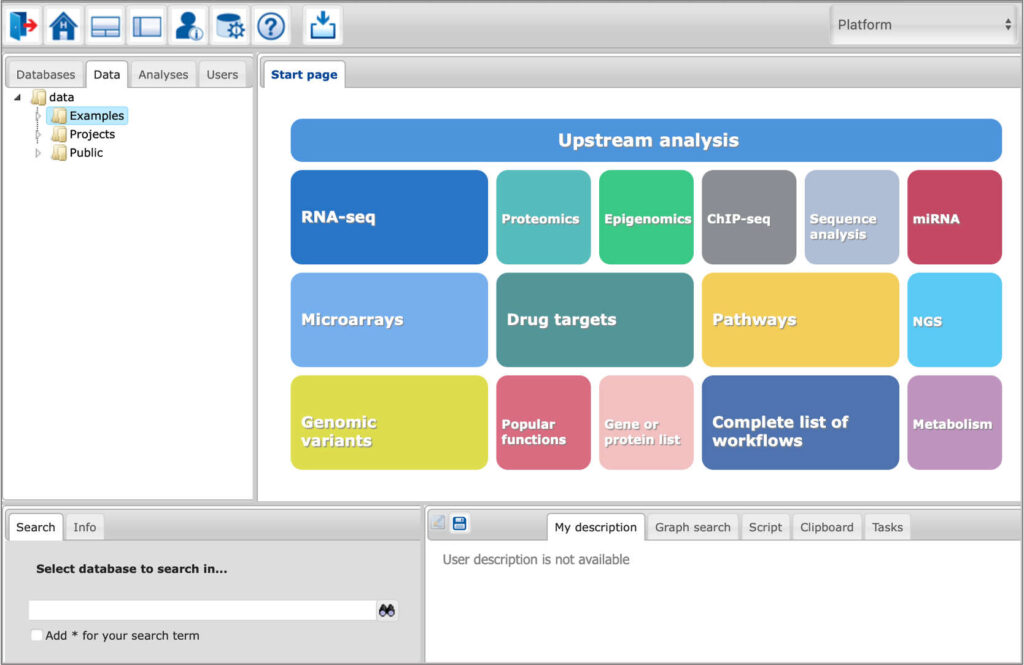
GeneXplain is providing the best-in-class bioinformatics tools for various research applications to its customers. Besides that we fully support the idea of openness and availability of information to the scientific community and for this reason we are proud to share with you a variety of great tools and valuable information resources that were made publicly available by us for free regardless of your occupation and research interests.
We wish you good luck in your research!
Tools
geneXplain platform
geneXplain platform: bioinformatics analysis toolbox
Work with human, mouse and rat genomes to perform bioinformatics analysis on all levels of complexity, starting from basic operations and statistics and ending with molecular mechanisms studies of various processes with integrated promoter and pathway analysis.
Learn more about geneXplain platform and get your free account here.

GlioSurvML
GlioSurvML: a machine learning based Glioblastoma Survival Predictor
Predict the survival group of glioblastoma patients based on transcriptomics data with this machine learning classifier
To learn more, see:
Kalya, M., Kel, A., Leha, A., Altynbekova, K., Wingender, E (2022) Machine Learning based Survival Group Prediction in Glioblastoma. Link
and go here to the tool.
eBioMeCon
eBioMeCon: embedding of BioMedical Concepts
Identify related biomedical concepts (diseases, drugs, genes, pathways).
To learn more, see:
Alachram, H., Chereda, H., Beißbarth, T., Wingender, E., Stegmaier. P. (2021) Text mining-based word representations for biomedical data analysis and protein-protein interaction networks in machine learning tasks.
PLoS One 16, e0258623. Link
and go here to the tool.
ProTargetMiner
ProTargetMiner – a proteome signature library of anticancer molecules for functional discovery.
To learn more, see:
Saei, A.A., Beusch, C.M., Chernobrovkin, A. et al. ProTargetMiner as a proteome signature library of anticancer molecules for functional discovery. Nat Commun 10, 5715 (2019). Link
and go here to the tool.
ProteoTracker
ProteoTracker is a free tool for studying of cell type transitions. This web-based visualization tool allows studying of such transitions by simultaneous measurement of protein expression and thermal stability changes in cells. Such detailed characterization of cell type transitions is essential for cell biology in general and particularly for the development of stem cell-based therapies in regenerative medicine.
To learn more, see:
Sabatier, P., Beusch, C.M., Saei, A.A. et al. An integrative proteomics method identifies a regulator of translation during stem cell maintenance and differentiation. Nat Commun12, 6558 (2021). Link
and go here to the tool.
Information Resources
Classification of Human Transcription Factors
Classification of Human Transcription Factors (TFclass)
Free download TFClass descriptions
Search for a transcription factor (TF)
Free search for a transcription factor within the TRANSFAC factor table
ENDONET
ENDONET: List of messengers/hormones and their receptors
Extracted from the EndoNet database, the list exhibits numerous ligand-receptor pairs, including their links to EndoNet, UniProt and HumanPSD.
Learn more:
Dönitz, J. and Wingender, E. (2014) EndoNet: an information resource about the intercellular signaling network.
BMC Syst Biol. 8, 49. Link
and go here to the full list.
Disease similarity maps
The HumanPSD™ harbors one of the largest human disease biomarker databases with over 123,000 gene-disease assignments curated from the scientific literature. The detailed information encompasses a classification of biomarkers into four classes, Causal, Correlative, Negative and Preventative, that indicate a biomarker gene’s role in the associated disease. The disease similarity maps depict inferred disease-disease relationships on the basis of shared causal biomarker genes, with the preventative biomarkers subsumed. A disease network derived from these relationships organized disease entities into clusters with apparent biomedical relevance. Furthermore, several of the inferred associations coincided with known clinical correlations such as comorbidities or known disease etiologies (details).
Open geneXplain disease similarity maps
EDUCATIONAL WEBINARS
GeneXplain is holding free educational webinars devoted to various aspects of biomedical research and gene regulation studies.
Check our Coffee break with TRANSFAC free educational webinars series.
